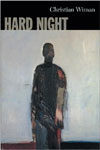| FEATURE |
 |
Richard Jackson |
|
|
"Language-Driven Poetry: AN INTRODUCTION TO THE PRINCIPLE OF
GENERATING POEMS" begins with Dante and Petrarch and walks us through poems of Wordsworth, Keats, Robert Frost, Andre Breton, Cesare Pavese, Richard Wilbur, Wislawa Szymborska, Anna Akhmatova, all the way to Heather McHugh to demonstrate that the imaginative vision possible to us through poetry exists not in the dressing up of ideas, feelings or events that the poet tries to find words to describe, but in its exploration of language, "not merely a record, but a gesture always trying to escape itself, escape our human condition towards something universal…"
|
Richard Jackson |
 |
"Place Message Here",
"Letter From Slovenia",
"Letter From Tuscany",
"Letter to Stern From Arezzo",
and "If I Can't Love You", all new poems by Richard Jackson |
Robert Bly |
  |
An interview by Paula Gordon and Bill Russell, a special audio
program of The Paula Gordon
Show. |
Christian
Wiman |
 |
"A Darker
Shade of Grey: Christian Wiman’s Hard Night," a review by
Chelsea Rathburn points to Wiman’s work as expression of the poet’s
awesome responsibility to the power of language. "What words or
harder gift/ does the light require of me," Wiman writes, "carving
from the dark/ this difficult tree?"
HARD NIGHT Copper Canyon Press, 2005.
|
| |
|
|
|
|
|
|
Chelsea Rathburn
|
|
|
 Chelsea
Rathburn is a poet and freelance writer living in Atlanta. Her
first collection,
The Shifting Line,
just out by the University of Evansville Press, won the 2005 Richard
Wilbur Award. Chelsea
Rathburn is a poet and freelance writer living in Atlanta. Her
first collection,
The Shifting Line,
just out by the University of Evansville Press, won the 2005 Richard
Wilbur Award.
|
|
Christian Wiman's "Hard Night"
by Chelsea Rathburn |
 |
|

Hard Night
by Christian Wiman
Copper Canyon Press, 2005
A Darker Shade Of
Grey: Christian Wiman's Hard Night
Most readers of poetry know Christian Wiman by
virtue of their being readers of Poetry.
Since becoming the magazine's editor in 2003, Wiman
has attracted both praise and controversy. (In fact,
one "customer review" on Amazon.com warns
"Don't buy this jerk's books.")
With any luck, Hard Night,
Wiman's second collection, will shift some of the
attention away from his editorial policies and onto
his considerable talents as a poet. Far-reaching and
inventive, the poems in this collection range in
length from eight lines to 36 pages and in form from
free verse to blank verse and quatrains. Though
stylistically diverse, they share an unwavering
attention to craft.
Wiman's poems feel so carefully wrought, it is as if
they were chiseled into stone: "What words or
harder gift/does the light require of me," the
poet writes in the title poem, "carving from the
dark/ this difficult tree?" Quiet and nuanced,
these are poems that require—and
deserve—careful reading. While many have an
underlying metrical pattern, most notably iambic
pentameter or trimeter, Wiman does not hesitate to
lengthen or shorten a line if the subject requires
it. As a result, nearly every line in the book ends
exactly where it should—I find it difficult to
imagine them breaking anywhere else. This is a rare
accomplishment, especially when combined with
scattered rhyme.
Skilled at balancing form and content, Wiman is also
a master of precise language. This is especially
apparent when he is describing emotions that are
ordinarily overwhelming or imprecise. Consider the
Frostian "The Funeral," in which the
speaker watches the mourners at a country funeral
singing
out-of-time, hopelessly out-of-tune,
yet strong, encompassing, as if it came from
hearts
that knew as well as loss what loss would be
soon—
a stab inside of every dawn at first,
then a scent, maybe, a story someone tells,
and each day a little less, a little more lost,
until finally some dusk they find themselves
standing like strangers at their own dead pain,
without confusion though, without bitterness,
as if within remembrance itself they sang
that to forget is also to be blessed.
Along with a close attention to form and language,
these poems share a consistent tone—established
before the book is ever opened. The cover shows the
silhouette of a man, his face in shadow, his features
made indistinguishable by darkness. It's a fitting
image, for the poems inside Hard Night
are preoccupied with isolation and loss, missed
connections, and blank landscapes.
In "Poštolka," two lovers share an
extraordinary moment—a falcon landing upon an
apartment window sill—but a deep connection,
like the moment described, is fleeting:
I could almost speak
the love I almost felt.
Wish for something, you said.
A shiver pricked your spine.
The falcon turned its head
and locked its eyes on mine,
and for a long moment I'm still in
I wished and wished and wished
the moment would not end.
And just like that it vanished.
A shiver pricks my spine every time I
read "Poštolka," which has become one
of my new favorite poems and which I've pressed upon
unwitting friends and family. Happily, a good number
of the other lyrics in Hard Night
rival it in terms of emotional complexity and power.
Short lyrics are in the minority, however; more than
half the book is taken up by three long poems, which
make up the first, middle and last of its five
sections.
If the short poems focus on particular places or
moments, the long poems encompass the world. The
first is a meditation on dreaming, waking life and
love that ends, surprisingly naturally, with the
speaker reciting the names of provinces in Burkina
Faso. The second, following a long-married couple
home-bound by an ice storm, finds the moving in the
mundane.
The final, and longest, poem in the book is
"Being Serious," a 22-part biography of a
man named Serious who, existing in "constant
tension," serves as a springboard for a
meditation on modern life. In the first section, we
meet Serious inside the womb:
Serious spins and spins
With his dumb dolphin grin
In the best bed there is,
Where there's no guilt and no sin,
No child more inner than this;
Nothing to will
And nothing to want,
No body you both are and haunt;
No drug of disappointment
Or feeling that there's never now
(Or do these seep in somehow?);
No suffering the world's idiocy
Like a saint its pains;
No traffic and no planes;
No debts, no taxes,
No phones and no faxes;
No rockslide of information
Called the internet.
Serious isn't. Yet.
We follow along as Serious is born, Serious goes
to school, Serious pays a bill, and Serious has a
date with Doom. (Many of these are the sections'
actual first lines.) Some of these passages achieve
humor and explore what it means for all of us to be
alive. Others, such as "Serious gets
online," are reaching too hard for a
punch-line... and remaining un-funny. More than once,
I found myself wishing that both Serious and Wiman
would Lighten Up.
And that is my ultimate complaint with Hard Night,
a book where even the humor is black. The darkness is
appropriate for the situations in the individual
poems, such as the exquisite "Night's Thousand
Shadows," which takes place at a parent's
deathbed. But without a single poem of unbridled love
or joy to offset the mourning, loss and isolation,
the bleakness is relentless. It reminds me of a
painting missing a key color: a beautiful composition
to be sure, but how wonderfully a stroke of red would
play up all those blacks and grays!
|

|